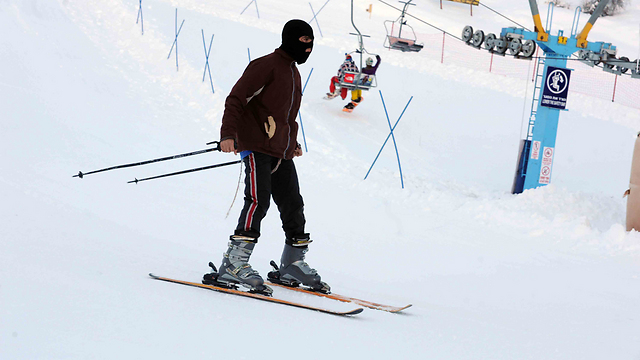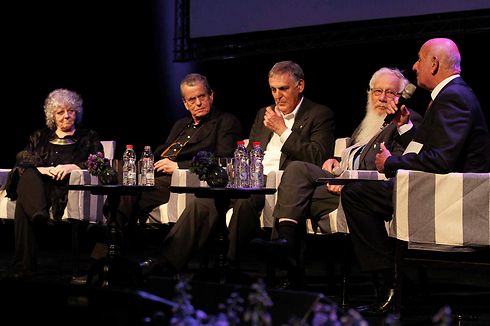
So there are no secrets, and we better accept the fact that people know about us. The question is what exactly do they know? Or to be more precise, what do those complete foreigners think they know about us?
Instead of biting our fingernails in anxiety, we decided to go with the stereotype. In an act of pure Israeli chutzpah, we sent some of our reporters in selected cities around the world to harass passersby with a questionnaire containing dozens of questions about Israel. Yedioth Ahronoth's correspondents in Paris, London, Berlin, Stockholm, Barcelona and Los Angeles managed to trap 105 innocent and surprised respondents, and the rest is history.
Obviously, our spontaneous survey did not aim to come up with any scientific responses, but it does provide a peel into what the world thinks about us. Here are the results.
The cheeky and the beautiful
As part of the questions related to folklore and culture, we couldn't resist asking the million-dollar question: "What do you think about Israelis?" The distribution of responses here was particularly wide.
The Americans from LA expressed quite a lot of criticism. Half of them replied that the Israelis are insolent, and two said that they like to curse. The rest of the American answers split between "happy" and "smart."
Among the Parisians there was no criticism, and the answers ranged from "warm" and "nice" to "regular" and "like you and me."
Most of the Swedes in Stockholm found it difficult to characterize the Israelis and so did the Londoners, although some of them did say that the Israelis are "hot-tempered," "educated," "nice and loud" and also "violent."
In Barcelona the responses were particularly diverse, but one answer which repeated itself was "educated." Two Spaniards said the Israelis were "open-minded," and other answers included "diligent," "intelligent" and "tidy."
The Berliners refused to attribute any unique traits to the Israelis, and the answer which repeated itself was: "They are normal just like all other people."
And there were those who had something to say about our looks too: "The Israeli men are handsome and the Israeli women are beautiful" was an answer which repeated itself quite a lot, and even some of Berlin's men agreed that there is a link between beauty and Israeli women. The Berlin women, on the other hand, had no idea what distinguishes Israeli men from their fellowmen in other places in the world.
At the end of the desert there is a sea
So it turns out that Israel is no longer associated with the desert. Well, almost. As part of a free associations question, 6% of our respondents mentioned heat and desert as the first things that come to mind when they think about Israel. Others, though only a few, mentioned the Dead Sea, the Red Sea and "a beach."
Forty-two percent of the respondents didn’t know that the desert constitutes the majority of Israel's territory (60% of the territory, to be precise. Did you know that?) In addition, the foreigners find it difficult to associate Israel with geographical components like snow. Half of the respondents never heard of Mount Hermon and think it is impossible to ski in Israel in the winter.
Another geographical mistake has to do with size. Forty-seven percent of the respondents refused to believe that one can cross Israel from the east to the west in just one hour.
High-tech and military
When we asked if Israel had the highest number of Nobel Prize laureates per capita, 68% of the respondents said yes. It's unclear if this is because they think we have a small number of residents or because they are actually aware of the facts.
Further support for the Israeli wisdom was found when the respondents were asked whether the USB flash drive was invented in Israel. Fifty-one percent said it was, and they are right. The greatest doubt was expressed in Barcelona and Berlin. In Los Angeles, where respondents made the most geographical mistakes, they demonstrated technological and scientific proficiency both in this question and in the Nobel question.
However, only few respondents linked Israel to high-tech in the open questions. When they were to mention the name of an Israeli company, the most common response was El Al, followed by Teva (other names mentioned were Gottex, Gideon Oberson, Uzi and even Maccabi Tel Aviv).
Only few respondents mentioned high-tech firms, led by data protection company Checkpoint and Mercury, which was acquired by HP. Some mentioned the issue in the open association question, with one respondent calling Israel "a high-tech empire" and the other saying "it has a lot of high-tech and a lot of military." Which brings us to the next subject.
The art of politics
A startup nation or not – the world has yet to be convinced but believes that politics, borders and military are the name of the game here.
For example, an open question in which respondents were asked to name a famous Israeli figure yielded almost only statesmen, led by President Shimon Peres and Prime Minister Benjamin Netanyahu (each of whom were mentioned in close to 20% of the answers). The next in line were late Prime Ministers Yitzhak Rabin and Ariel Sharon. Israel's first prime minister, David Ben-Gurion, and fourth prime minister, Golda Meir, were also mentioned more than once. Late Minister and Chief of Staff Moshe Dayan made it into the list too, as did former Prime Minister Ehud Olmert.
A small but fine portion of the answers was dedicated to those who are not involved in politics, although some of them are only vaguely affiliated with Israel. Oscar winner Natalie Portman, who has been living in the United States since the age of four, topped the list of non-politicians, followed by supermodel Bar Refaeli, singer Dana International and basketball player Omri Casspi. Some people mistakenly mentioned Woody Allen and Albert Einstein as famous Israelis.
Israel, you've got a problem
Loud explosions were heard in most answers to the free associations question. The respondents linked Israel to the Israeli-Palestinian conflicts, to wars, occupation, military and "the strongest army in the world."
Other responses were "a young state with a lot of problems," "a difficult state with problems" and "a state fighting for its existence."
In the question about Israeli companies, 10 respondents in Los Angeles said: "All weapons companies are Israeli, right?"
Well, they're not. But weapons are definitely the stars of the global consciousness when it comes to Israel. Seventy-nine percent knew that all IDF soldiers are authorized to fire a gun, including clerks (21% said it wasn't true), and 18% believe that the compulsory service in the Israeli army lasts a decade. Four Californians even thought that the service lasts more than 10 years.
It's interesting that despite the emphasis given to the conflict with the Palestinians in the responses, 43% mistakenly assumed that Arabic studies are compulsory in Israel's high-school. One Berliner even said: "Of course, the Jews are Arabs. They are both Semite people." Sometimes, it seems, that's the way it looks from there.
Shabbat and drivers
An interesting mixture of answers was received on state and religion issues. On the one hand, 66% of the respondents rejected the claim that most Israelis were religious or Orthodox. On the other hand, many mentioned Judaism in the free associations question, associating Israel with "Jews," "the Jewish state," "the Old Testament," "The land of the Bible," "the Holy Land," "religious" and even "prayer."
Jerusalem was a common response too (Tel Aviv was only mentioned once), as was the Star of David. The Berliners were the only ones who associated Israel with "Holocaust and Nazism." "Kibbutz" was mentioned quite a few times too.
Most respondents believe there is still a certain level of separation between state and religion in our country, and even more than there actually is. Seventy-one percent knew that women are not allowed to pray with men at the Western Wall, but 74% new that restaurants in Israel are allowed to serve non-kosher food and 60% could not believe that there is no public transportation here on Shabbat.
Another common mistake among the residents of foreign democracies had to do with Bible studies in Israel. Thirty-eight percent, mainly respondents from London and Berlin, believe Bible studies are not compulsory in Israeli schools.
Saying no to drugs
More democratic or more Jewish? The respondents don’t see Israel as overly democratic. Despite its reputation as being gay friendly, particularly when it comes to Tel Aviv, most respondents rejected the claim that same-sex marriages are legal in Israel. Sixty-six percent said it wasn't true, and 4% said they didn't know.
The respondents demonstrated further knowledge when we asked them whether it was legal to use marihuana in Israel from the age of 18. Seventy-three percent said it was illegal.
Falafel or gefilte fish?
We asked the respondents to mention the name of a famous Israeli dish. Despite the complex gourmet developments in the Israeli culinary world, the basic foods still stand out. There is no doubt, however, that the Israeli efforts to appropriate some Arab-Palestinian-Lebanese dishes have been quite successful. The undisputed winners were falafel and hummus, and some also mentioned shakshuka and tahini. There was one respondent who couldn’t remember the complicated name and just said: "That dish made of sesame seeds."
The respondents also mentioned oranges, fruit salad and kebab, and one of them said: "It's like Lebanese food."
Other common answers were from the Jewish Eastern European genre: Challah, matzo, chicken soup and, of course, gefilte fish. As usual, with food, the melting pot works quite well.
Eldad Beck in Berlin, Lior Zilberstein in Paris, Yaniv Halily in London, Liran Lotker in Stockholm, Maya Mahler in Barcelona and Tzipi Shmilovitz in Los Angeles contributed to this report.



















